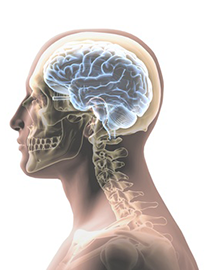
Clinical Depression: Biomarkers Not a Smile
|
References
1 Stonebridge, C. & G. Sutherland. 01 September 2016. Healthy Brains at Work: Estimating the Impact of Workplace Mental Health Benefits and Programs. Conference Board of Canada.
2 Anum, S.A. 03 May 2017. Me, My Depression and the CAN-BIND-1 Study. Blog.
|
Depression is the leading cause of disability in the world and it is costly, responsible for at least $32.3 billion a year in lost productivity in Canada.1 And yet, depression remains poorly understood and is a major source of stigma. In this context, research from CAN-BIND – the Canadian Biomarker Integrated Network in Depression – acquires new importance and urgency.
How does depression feel?
It’s never possible to know exactly how another person feels, but Makyla Jabour, a participant in the CAN-BIND-1 Study2 gives us some idea of how her depression felt before treatment:
Finding the biomarkers
Professionals know that clinical depression is about “more than a smile.” CAN-BIND is, after all, an unprecedented initiative to find the “biomarkers” of depression. A biomarker is characteristic that can be objectively measured and evaluated as an indicator of normal or abnormal biological processes. The ability to detect and measure these biomarkers will help physicians diagnose depression and find the most effective treatment tools. It will also help them prevent depression and predict whether patients are likely to relapse.
The fact that there are biomarkers for depression runs counter to the notion that depression is an emotional problem that can be cured with a smile. It should also put to rest reasons for stigma. A person with changes in brain function that can be captured through a brain scan or through other tests needs medical help to restore normalcy, not social disapproval.
CAN-BIND researchers are now analyzing rich datasets to find biomarkers, primarily associated with three types of measures:
These measures can lead to more precise treatments involving drugs, talk therapy or neurostimulation.
No single solution
Because there are different types of depression, biomarkers and treatments are different for every individual. CAN-BIND researchers are clearly not looking for a single solution to a disease called “depression.” They are looking for ways to tailor treatments to meet the needs of individual patients. Similarly, employees with clinical depression will each behave differently at work and require different accommodations and benefits for varying periods of time.
Employers who wish to support their employees and reduce productivity losses need to ensure they offer flexible benefit packages that acknowledge the nature of personalized medicine and adequately address the needs of individual employees. It is also important for everyone – employers and employees alike – to recognize the high cost of depression and become aware of the risk factors that CAN-BIND researchers and others are discovering so that they can take steps to prevent depression. Greater understanding will also help reduce stigma and thus remove a major barrier to well-being for those who suffer.
When asked what inspired Makyla to share her story she replied that she liked talking about it:
I like people understanding and knowing that people with depression aren’t people who are mopey all the time. People with depression are often people like me who are outgoing and social, the ones who are always up for a good time.
Learning and understanding can lead to better times for people and happier, more productive workplaces. bh
|

 Changes in the brain can serve as biomarkers for prevention and early detection of depression. They can also predict responses to various treatments or the possibility of relapse. CAN-BIND researchers are working to identify these and other biomarkers of depression.
Changes in the brain can serve as biomarkers for prevention and early detection of depression. They can also predict responses to various treatments or the possibility of relapse. CAN-BIND researchers are working to identify these and other biomarkers of depression.